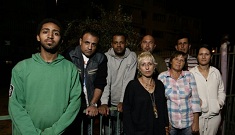 Vibrating pagers are one solution, but they are only activated when owners are in their hometown.
Vibrating pagers are one solution, but they are only activated when owners are in their hometown.
By Tamir Cohen
10:16, 14.11.12
Haaretz
A few months ago, during a previous escalation in the south, Rima Popov and her husband were driving to Ashdod from their home in Kiryat Malakhi. Suddenly, they saw that all the cars around them were stopping at the side of the road and their occupants were getting out and running for shelter. It took them a few seconds to grasp that the siren warning of an incoming rocket had sounded. The Popovs couldn’t hear the siren, because they are deaf.
Both have pagers that usually give them warning by vibrating. But because the rocket wasn’t aimed at their hometown, the pagers weren’t activated.
Three years ago, the Israel Defense Forces’ Home Front Command finished distributing pagers to all the deaf people who live in rocket range of Gaza. At the time, this solution seemed promising. But today, not everyone is happy with it – because it turns out the pagers are only activated when rockets are aimed at the owner’s hometown, and thus offer no protection when they are out of town.
“If we leave the city, we have no solution,” said Doron Levy, president of Israel’s Association of the Deaf. “Also, we sometimes get the warning a few minutes late, after the missile has already landed.”
The decision to only activate the pagers when rockets are approaching the owner’s place of residence stemmed from experience gained in the Second Lebanon War in 2006. Then, all residents of the north received a warning whenever rockets were aimed at Kiryat Shmona, but this caused widespread and unnecessary panic.
For the deaf, however, this restriction is a problem, Levy said, because many work outside their hometown.
Levy said his organization has been fighting with both the Home Front Command and the Social Affairs Ministry over a solution to this problem. “They’re trying to help, but they have budgetary and developmental limits,” he said.
Another problem, he added, is that the distribution of pagers hasn’t kept pace with the expanding range of Gaza’s missiles. “In Rehovot, for instance, they were given out, but not in Rishon Letzion. It’s irrational.”
Rima Popov said the deaf “live in fear, and they don’t leave their town.”
She added: “Sometimes, I’m walking down the street and see people running, but then it’s already too late. It’s very frightening to leave the city, but also within the city, because you don’t always feel the warning. That happened to me once when I was walking down the street, and someone who knew me simply grabbed me and ran. I didn’t understand what was happening at all.”
Members of Kiryat Malakhi’s association for the deaf said they hoped something would come of a promise made by MK Otniel Schneller promise on Monday to personally deliver their request to Home Front Defense Minister Avi Dichter: that the geographic area in which the pagers are activated be enlarged. But they noted that they were also promised a solution after a meeting with representatives of the Home Front Command eight months ago, and since then nothing has happened.
The IDF Spokesman said in response that all the pagers are supposed to be programmed with both the owner’s hometown and his or her workplace. Owners can also contact the Beeper company to ask that additional locations to be programmed in, the spokesman said.
But Beeper noted that adding a location means the owner will get a warning anytime a rocket is aimed at that locale, regardless of whether or not he or she is in the area. The company also said that adding a location would require bringing the pager to its offices in Ramat Gan or Ashdod.
The Social Affairs Ministry said the pagers are the Home Front Command’s responsibility: Its only role is supplying the list of deaf people who need them.
Source: www.haaretz.com/news/national/for-deaf-israelis-rocket-warnings-come-only-at-home.premium-1.477526#




